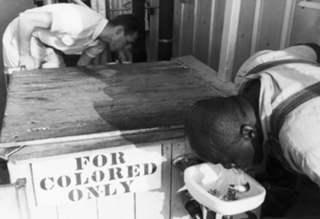OCD
The OCD-Racism Connection and Its Impact on People of Color
Discrimination can create confusing symptoms in BIPOC with OCD.
Posted September 13, 2020 Reviewed by Gary Drevitch

There are many barriers people of color face when it comes to getting help for obsessive-compulsive disorder (OCD), and several are anchored in racism.
OCD is found in roughly the same proportion among all demographics. However, in North America, people of color are more likely to be misdiagnosed and undertreated for the disorder, according to a new study published in Clinical and Experimental Psychology by experts at the Houston OCD Program, the Baylor College of Medicine, the Menninger Clinic, and Harvard Mclean Hospital (Katz et al., 2020).
The researchers found that even though all ethnic and racial groups experienced equivalent average levels of severity, Black, Indigenous and other People of Color (BIPOC) with more severe anxiety symptoms were not receiving treatment at the same rates. Compared to White patients, BIPOC were much less likely to receive counseling, exposure and ritual prevention (the gold-standard treatment for OCD), or medication (not a cure but still helpful). Thus, it is clear that the gap between receiving the right diagnosis and therapy for people of color persists in mental health care, creating barriers to alleviating suffering.
Unfortunately, racism limits what we know about OCD in people of color. Racism also makes existing OCD symptoms worse, influences symptom presentation, and limits access to mental health care. Research published in the last few years is starting to show the importance of cultural considerations in understanding OCD, but the serious impact of racism is far from solved.
Racism makes existing OCD symptoms worse.
Numerous studies have shown that among African Americans, Hispanic people, and members of other marginalized groups, racial discrimination is a risk factor for poorer mental and physical health overall (Lewis, Cogburn, & Williams, 2015). One way that racial discrimination can lead to poor health is through ongoing social stress, whereby chronically elevated cortisol levels worsen existing conditions and increase susceptibility to mental disorders. Stress due to discrimination may trigger dysfunctional coping behaviors, such as smoking or overeating, and cause difficulties, such as poor sleep, that directly contribute to health problems as well.
Using data from the National Survey of American Life (NSAL), our lab examined OCD symptoms in Black Americans across the U.S. and found that experiences of racial discrimination were associated with increases in nearly every OCD symptom dimension examined (Williams et al., 2017).

Racism influences symptom OCD presentation.
Among racialized groups, OCD symptoms may be influenced by negative racial stereotypes. When stereotypes and prejudices are salient, affected group members tend to decrease behaviors that might confirm the stereotypes. For example, research has found that contamination avoidance and aversion by African Americans was greater when stereotype cues (Jim Crow segregation photos) were shown to study participants (Olatunji, Tomarken, & Zhao, 2014). This suggests that greater concerns about the importance of cleanliness among Black Americans may function to compensate for negative stereotypes, which may in turn pose a barrier to the disclosure of OCD contamination symptoms to mental health professionals.
Black Americans may also be hesitant to reveal other unacceptable thoughts for fear of validating false racial stereotypes of being violent or sexually deviant, which are common OCD-related anxieties. OCD content might also revolve around fears of being victimized due to race. One Black person with OCD writes:
"So when does the neurobiology of OCD end and the adaptive hypervigilance as a Black person begin? I cannot speak for other Black people with OCD, but for me, race colours my OCD experience; my Blackness and my OCD are indivisible... On the Yale-Brown Obsessive Compulsive Scale, I score for 'checking for harm to others' and 'checking for mistakes.' But what does it mean for a Black person to obsess about if they have harmed others? So many of us try to neutralize ourselves so that white people aren’t 'threatened' because we know white fear spells Black death."
Struggles around racial identity can also play into symptom expression. One person of color with OCD describes her struggle as follows:
"I am biracial (African American and Italian). I have really light skin but have really curly hair. I grew up in a white suburb and have often been told I ‘talk white.’ I also have a sister but she is darker than I am and takes more after my mother (Black side). I seem to have obsessions and avoidance around my identity beyond the traditional biracial identity crisis."
Research has found harmful mental health effects for many types of discrimination. But among Black Americans, OCD symptoms were associated with racial discrimination but not non-racial discrimination—such as mistreatment due to age, gender, or weight (Williams et al. 2017). This is consistent with findings of Goodwill and colleagues (2019), who found that everyday racial discrimination was the only type of discrimination that was significantly associated with both increased depression and suicidal thoughts. This could mean that issues like age and gender-related discrimination are less trying for BIPOC than racial discrimination, perhaps because racial discrimination is more frequent, more severe, or more difficult to navigate.
Racism creates direct barriers to care.
Discrimination also impacts the use of mental health services, as people of color may fear mistreatment in medical contexts. For example, research by Woodward (2011) found that Black-White disparities in service use were non-existent when they accounted for discrimination, indicating that discrimination in a real factor in the lower service use rates among people of color. Discrimination can cause also direct barriers to treatment, such as when therapists are less willing to take on clients of color (Kuglemass, 2016; Williams et al., 2012).
What Therapists Can Do
Ketz and colleagues (2020) note an urgent need for increased therapist education and more clinical services that are accessible for BIPOC with OCD. Therapists treating OCD in BIPOC should invest extra effort into building rapport and helping clients understand that in OCD, thoughts about violence, harm, sexual fears, and magical thinking are a normal part of OCD anxieties, and cleaning and checking are common compulsions. Experiences of racialization may be embedded into the client’s symptoms, but when therapists dismiss or minimize challenging race-based experiences, they can do more harm than good. Therapists should also be sure to discuss with all BIPOC clients how they appraise and manage experiences of racism in their daily lives.
OCD is a treatable condition. The International OCD Foundation (IOCDF) has an online BIPOC Resource Center to provide education, awareness, and resources for OCD and related disorders in Black, Indigenous, and People of Color. OCD does not discriminate—people of all racial and/or ethnic identities are impacted and need appropriate, culturally-informed care.
To find a therapist who specializes in OCD, visit the Psychology Today Therapy Directory or the International OCD Foundation Directory.
References
Goodwill, J. R., Taylor, R. J., & Watkins, D. C. (2019). Everyday Discrimination, Depressive Symptoms, and Suicide Ideation Among African American Men. Archives of Suicide Research. Advance online. doi: 10.1080/13811118.2019.1660287
Katz, J. A., Rufino, K. A., Werner, C., McIngvale, E. & Storch, E. (2020). OCD in Ethnic Minorities. Clinical and Experimental Psychology, 6(1), 01-061.
Kugelmass, H. (2016). “Sorry, I’m Not Accepting New Patients”: An Audit Study of Access to Mental Health Care. Journal of Health and Social Behavior, 57(2), 168–183. Doi: 10.1177/0022146516647098
Lewis, T. T., Cogburn, C.D., & Williams, D. R. (2015). Self-reported experiences of discrimination and health: Scientific advances, ongoing controversies, and emerging issues. Annual Review of Clinical Psychology, 11, 407–440. doi: 10.1146/annurev-clinpsy-032814-112728
Olatunji, B. O., Tomarken, A., & Zhao, M. (2014). Effects of exposure to stereotype cues on contamination aversion and avoidance in African Americans. Journal of Social and Clinical Psychology, 33 (3), 229-249.
Williams, M. T., Domanico, J., Marques, L., Leblanc, N., & Turkheimer, E. (2012). Barriers to Treatment Among African Americans with Obsessive-Compulsive Disorder. Journal of Anxiety Disorders, 26(1), 555-563. doi: 10.1016/j.janxdis.2012.02.009
Williams, M. T., Taylor, R. J., Mouzon, D. M., Oshin, L., Himle, J. A., & Chatters, L. M. (2017). Discrimination and symptoms of obsessive-compulsive disorder among African Americans. American Journal of Orthopsychiatry, 87(6), 636-645. doi: 10.1037/ort0000285




